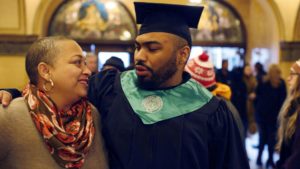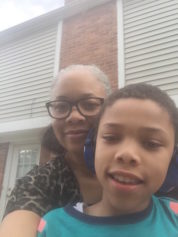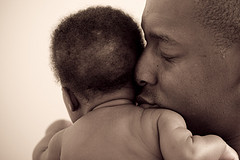
Paris King (right) graduated from high school with honors before enrolling at Roosevelt University. (Photo by Phil Velasquez/The Chicago Tribune)
After enduring a series of setbacks that would’ve proved difficult for any college student, a Chicago man successfully earned his bachelor’s degree in history from Roosevelt University last week.
But Paris King isn’t your average 23-year-old; he’s on the autism spectrum and has loved learning. So, his parents saw no reason why he should not continue his education post-high school. College had really always been a part of the plan.
When King finally crossed the stage at his graduation ceremony on Friday, Dec. 15, family, friends and faculty were there to cheer him on as they lauded his success as a college student living with autism, as well as his strength to overcome many personal challenges over the years, The Chicago Tribune reported. He has since become a role model for those with disabilities, proving that college is attainable for people on the spectrum.
“I came to college so I can learn more about the world we live in,” King told the newspaper. “It has been a fun experience, but it has been hard.”
The college grad is just one of four students with autism who earned bachelor’s degrees from Roosevelt this year, according to Danielle Smith, the associate director of academic success at the university. She said that number has continued to grow over the last four years, echoing a national trend of students with autism enrolling in college and finishing successfully.
There are currently no clear statistics on college enrollment of students living with autism spectrum disorder, the National Youth Transitions Center at George Washington University states, as colleges are prohibited by law, from asking students to disclose autism and any other disability on their applications. However, it is estimated that autistic students make up somewhere between 0.7 percent and 1.9 percent of the college population with an 80 percent incompletion rate.
The good news? Advocates say the significant increase in the number of people diagnosed with autism is helping foster discussion about how to understand the needs of the growing community and how to offer them more opportunities.
“It’s really important for every individual to be able to have access to lifelong learning opportunities,” Vanda Marie Khadem, founder of the Autism Higher Education Foundation, told the Chicago Tribune. “Parents are demanding it, and students are demanding it, and teachers are recognizing it.”
The road to graduation was anything but smooth for King, whose autism diagnosis came at 12 years old. For one, his dad died his freshman year. He then faced his own health issues, as he was diagnosed with multiple sclerosis just eight weeks later. His junior year, his mom was diagnosed with Stage 3 breast cancer that required aggressive treatment, according to the newspaper. He was also mugged near his home one evening.
Still, King didn’t let his personal issues stifle him. He thrived in his history and Black studies classes and made a new group of friends in an extracurricular club for video game lovers like himself. Though he takes a bit longer to focus and get his thoughts down than some of his peers, friends and teachers say King isn’t one to let a challenge stop him.
“He’s matured quite a bit, and I’m very proud of his progress,” his mother said. “And I do believe that has to do with him continuing his education and forging ahead.

